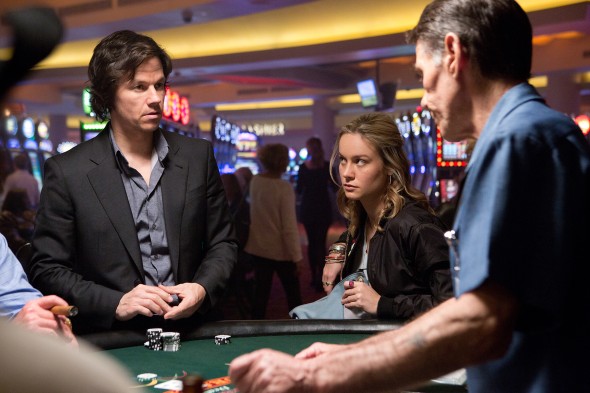Professor by day, high-stakes gambler by night

Mark Wahlberg plays a professor whose addiction is discovered by student Brie Larson in “The Gambler.”
We all gamble with our lives. Whether it’s paying a lot of money for higher education, taking a job or finding love, it’s a gamble.
Rupert Wyatt’s latest film, “The Gambler,” set for release Dec. 25, follows rich boy Jim Bennett (played by Mark Wahlberg) in the underground world of Los Angeles. He’s a literature professor by day and a high-stakes gambler by night. One of his students, Amy Phillips (Brie Larson), discovers his second identity after seeing him at an independent casino where she works. The unfolding of his secret leads to an inappropriate relationship between teacher and student.
Because Jim likes high-stakes gambling and is eventually in debt, he replenishes his funds from a dangerous loan shark. He struggles to pay back his debts, despite the financial help he receives from his mom (Jessica Lange) and old family “friend” Frank (John Goodman). He just keeps spending it until there’s not much left — money or life.
It’s hard to like Jim. There’s no better way to describe him than an over-privileged, self-destructive jerk. He thinks he’s entitled to everything, which is clear when he lectures his students, bordering on a harassment style of education. He’s awful to his mom, who herself feels entitled to a lot, but most of all, he’s horrible to himself.
The moment where we can like Jim is when he finally begins to understand that he’s suffocating and affecting those that he loves.

The literature professor portrayed in “The Gambler” bullies his students. At first, the character is difficult to like.
The story is loosely based on the 1974 film by Karel Reisz, which stars James Caan, a semibiographical account of screenwriter James Toback’s life.
But this version of “The Gambler” is different. For Jim, it’s all or nothing, victory or death. Yes, Jim appears to have an addiction, and yes, he puts lives other than his own at risk, but this isn’t a film about a gambling addiction; it’s something else, something bigger.
“This film, for me, is about a man who uses gambling as a way to get out,” Wyatt said. “So to escape from his life. It’s more a case of a guy who’s fed up with his life and wants to blow it all up and start again.”
The screenwriter, William Monahan, known for the script of Martin Scorsese’s 2006 “The Departed,” didn’t want to make the film about addiction.
“Monahan already had made that decision well before I got involved, which was to come at the notion of what does it mean to be a gambler in our lives,” Wyatt said.
Wahlberg takes on this question in perhaps one of his best roles. Here, he perfectly plays the rich boy. But the supporting actors shine just as much. Lange, as his mother, is fantastic; despite being uptight and cold at times, the character’s love for Jim is clear. Larson is cute and sassy, and it’s nice to see a fresh face on the big screen who looks well fed rather than under. And Goodman – what’s there to say? He’s always believable as a good old jolly Mafia-like character.
The film looks lush, with warm colors in the foreground and cold colors in the background.
Wyatt and Greig Fraser, the cinematographer, looked to Hal Ashby films and “Cyclo,” a 1995 Vietnamese film, for inspiration, Wyatt said.
“The aesthetic was born out of what we wanted to do with Los Angeles,” he said. “We wanted to do something very different in terms of people’s preconceptions of what L.A. can sometimes be, which is it a little artificial and anonymous and fluorescent.”
If the characters or story don’t interest you, see the film for its style. It doesn’t fall into any specific genre, and that’s refreshing.
But ultimately the film is a character-study of a man gambling his life away. It’s character rather than plot-driven, which Wyatt hopes Hollywood and audiences will eventually steer toward.
“To make ‘The Gambler’ was a really rare and great opportunity,” the director said.
